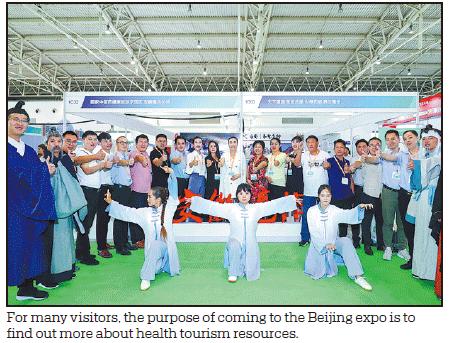New focus on the health tourism


Speaking about the event and health tourism in general, Song Qihui, a senior official from the ministry, says: "The country has paid great attention to its development in recent years."
The State Council has also issued directives to encourage health and medical tourism development across the country, Song says.
In 2016, five national government bodies, including the National Tourism Administration (now part of the Ministry of Culture and Tourism) and the State Administration of Traditional Chinese Medicine issued guidelines to promote health tourism. These guidelines call for health tourism facilities with distinctive elements to be developed by 2020. And the government has pledged to support medical, health management and leisure facilities in the development of health products.
Speaking about domestic demand, Song says: "Chinese consumption is also a guarantee for the health tourism market."
The donkey-hide gelatin maker Dongeejiao has managed to pack in 1.2 million traveler visits last year, says You Jinhua, vice-president of the company.
The gelatin is a traditional Chinese tonic that is one of the three treasures, along with ginseng and pilose antler, in the bible of traditional Chinese medicine, the Compendium of Materia Medica. It is believed to help in treating blood deficiency, insomnia and lung diseases.
Now, Dongeejiao offers tourists a chance to see how the products are made.
"Visitors can also see the production process.
"The idea is to enable visitors to fully experience the process," says You.
The company, based in the eastern Shandong province, expects the visitor numbers to cross 2.5 million this year.
To date, China has developed 13 health tourism demonstration facilities and 15 innovative zones for traditional Chinese medicine experiences across the country.
Bozhou, in eastern Anhui province, is one of the national health tourism zones that has seen more visitors from across the country, after it was launched in 2016.
"Now, there are about 30,000-40,000 visitors to Bozhou on a daily basis," says Wang Pingwu, the general manager of Huayinzi Biotech, a company in the city.
Many of them are businessmen, and they come for the TCM resources, according to Wang.
"Also, many visitors come to experience health tourism offerings and to see the hometown of the ancient Chinese physician Hua Tuo," Wang says.
"Being a national TCM tourism demonstration zone has helped Bozhou in bringing in visitors and boosting the local health industry."
Separately, Bozhou has developed TCM museums, cuisine and shopping, as well as hot springs, to meet traveler demands.
As for Wang's company, it makes skincare products with local TCM elements, such as peony blossoms and licorice, and rakes in 70-80 million yuan ($9.8-$11.1 million) a year.
Aiming to promote their products, he says visitors can visit one of the biggest peony gardens in China and make their own skincare products with professional guidance from the company.
The health tourism consumption potential has also got the attention of travel operators.

































